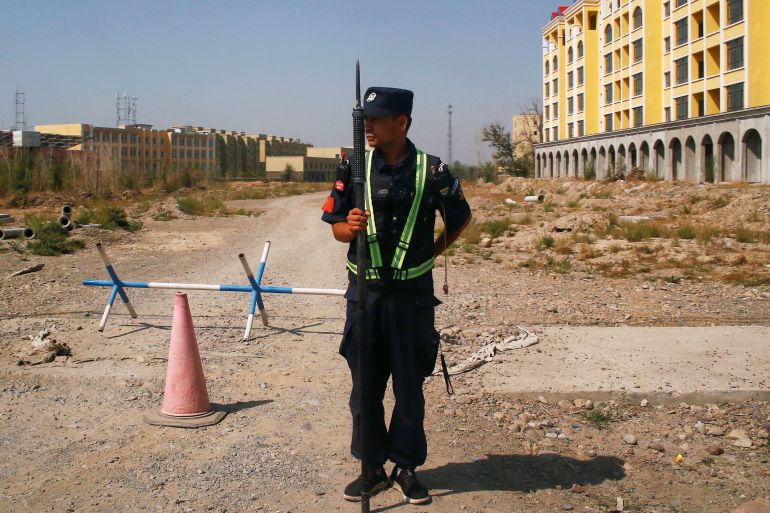China uses big data to select Muslims for arrest in Xinjiang: HRW
Rights group says Chinese policing programme selects people for arrest for ‘everyday, lawful’ behaviour.

A big-data program in China’s Xinjiang “arbitrarily selects” Muslims for detention, flagging behaviour such as wearing a veil, studying the Quran or going on the Hajj pilgrimage as reasons for arrest, according to Human Rights Watch (HRW).
In a new report on Wednesday, the rights group said it analysed a leaked list of more than 2,000 detainees in Xinjiang’s Aksu prefecture and found that the programme – known as the Integrated Joint Operations Platform (IJOP) – also flagged people for their relationships, their communications, their travel histories, or for being related to someone the authorities consider suspicious.
Keep reading
list of 4 itemsUighurs forced to eat pork as China expands Xinjiang pig farms
China slams Pope Francis over remark on Uighur minority in book
China rejects report Uighur children being separated from parents
“The Aksu List provides further insights into how China’s brutal repression of Xinjiang’s Turkic Muslims is being turbocharged by technology,” said Maya Wang, senior China researcher at HRW.
“The Chinese government owes answers to the families of those on the list: Why were they detained, and where are they now?”
The United Nations estimates that more than one million Turkic Muslims – most of them ethnic Uighurs – have been detained in camps in far-western Xinjiang. Activists say the purpose of the detention was to “erase the ethnic and religious identities of” Turkic Muslims and ensure their loyalty to the Chinese government.
Beijing denies the accusations, describing the camps as vocational training centres to help stamp out “religious extremism” in the troubled province.
HRW said the Aksu List – which dates from late 2018 – shows further evidence of the role big data and technology plays in helping officials select targets for “coerced thought transformation”. Earlier this year, campaigners documented how officials in Xinjiang’s Karakax used the IJOP to assess whether an individual should remain in detention. A Karakax official dismissed that report as a “fabrication”.
‘Pseudo-scientific fig leaf’
HRW said it obtained the Aksu list – a spreadsheet titled: List of IJOP trainees – from an anonymous source in Xinjiang and verified the list’s authenticity by checking it against official records, social media records, and consulting Uighur diaspora communities and two experts who have extensively documented Beijing’s crackdown in Xinjiang.
The HRW gave the example of Ms T, who was detained because the IJOP had flagged her for “links to sensitive countries”. The list said Ms T had received four calls from a foreign number in March 2017, which HRW found belonged to Ms T’s sister when they called it.
“Ms T’s sister said that Xinjiang police interrogated Ms T around the time the Aksu List recorded her detention date. The police had specifically asked about her sister because she lives abroad,” HRW said.
Ms T’s sister told HRW she has had no direct contact with her family in Xinjiang since then, but heard that Ms T was now working in a factory five days a week and allowed to go home only on weekends.
“Ms T’s sister believes Ms T is being forced to work in a factory against her will, noting that Ms T had been training for a different career before she was detained.”
In a second case, a man was detained for having studied the Quran in the mid-1980s, and having “let his wife wear a veil” in the early 2000s, HRW said. In a third case, a woman was detained for travelling outside Aksu, going to Kashgar once and staying overnight in Hotan once, both in 2013.
About 10 percent, or more than 200, of the people on the Aksu List were detained for “terrorism” and “extremism”, according to the spreadsheet, but the authorities did not allege that these detainees committed, incited, supported or plotted any acts of violence, HRW said.
Other reasons for detaining a person included their use of software such as a virtual private network (VPN), Skype or peer-to-peer file sharing application Zapya.
Going “off-grid” by switching off their phones or disappearing for periods of time was also listed.
HRW said its analysis of the Aksu List “strongly suggests that the vast majority of the people flagged by the IJOP system are detained for everyday lawful, non-violent behaviour”.
Wang said predictive policing platforms like the IJOP “are really just a pseudo-scientific fig leaf for the Chinese government to justify vast repression of Turkic Muslims”.
She added: “The Chinese government should immediately shut down the IJOP, delete all the data it has collected, and release everyone arbitrarily detained in Xinjiang.”
HRW also said there was preliminary evidence that the IJOP system is being used in China outside of Xinjiang.
A procurement document dated January 2020 shows the China Electronics Technology Group (CETC) which built the IJOP in Xinjiang built the same system in Yinchuan, the capital of Ningxia province.
The region has the highest concentration of ethnic Hui, also a Muslim minority.
“While it is unclear how the system is being used, religious restrictions on Hui Muslims – closing mosques and Arabic-language schools, scrubbing Arabic scripts from Halal restaurants – have been on the rise in Ningxia and other Hui Muslim areas since 2019,” HRW said.